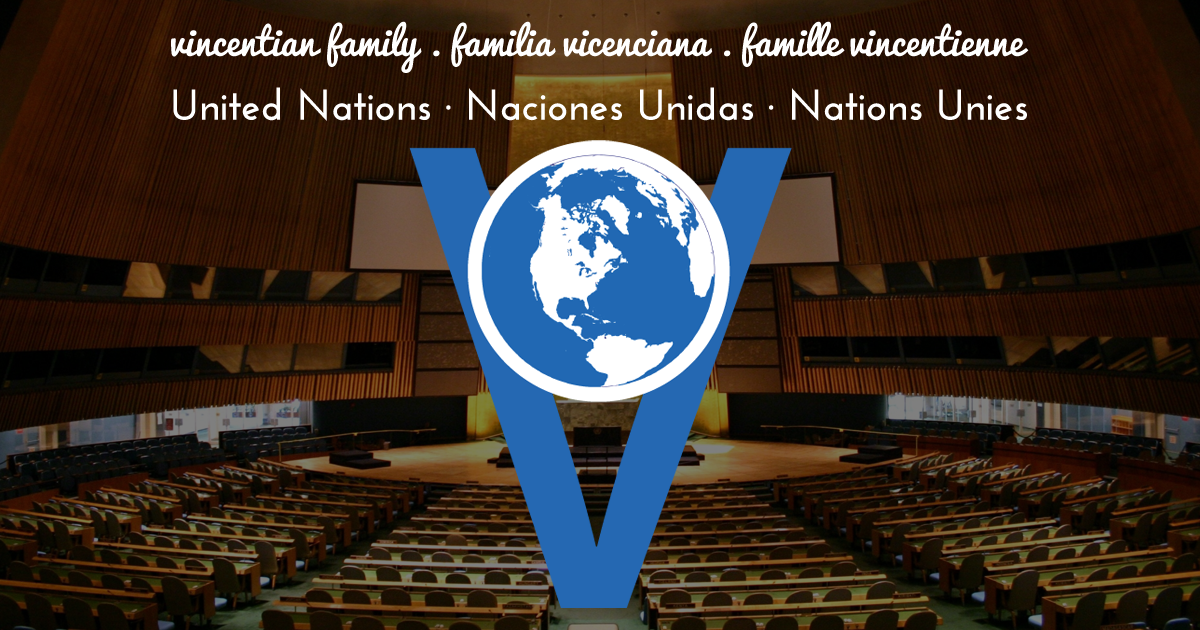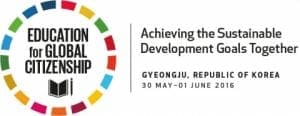
“A United Nations Department of Public Information (DPI) Conference is scheduled May 30-June 1 in Gyeongju, South Korea,” says Sr. Catherine Prendergast, D.C., of the Vincentian Family delegation at the U.N.
“We need new skills for new times – to foster greater respect and understanding between cultures, to give learners tools to make the most of diversity, to develop new values and behaviors of solidarity and responsibility, to harness the energy of young women and men for the benefit of all…This is the importance of education for global citizenship.” UNESCO Director-General Irina Bokova
 Education and global citizenship are the bedrock of sustainable development and climate action, according to the United Nations. How would you spread the word about their importance in achieving the Sustainable Development Goals (SDGs)? Would you script a movie? Organize a huge concert? Develop an app that enables large groups to advocate against poverty, hunger, and rampant consumption, but for care of the Earth? Call upon homilists to deliver regular messages about SDGs and leaving no one in the world behind? Transform education from a job-preparation focus to one which stimulates critical thinkers who make consumption and behavioral choices reflecting an interconnectedness with the rest of the globe?
Education and global citizenship are the bedrock of sustainable development and climate action, according to the United Nations. How would you spread the word about their importance in achieving the Sustainable Development Goals (SDGs)? Would you script a movie? Organize a huge concert? Develop an app that enables large groups to advocate against poverty, hunger, and rampant consumption, but for care of the Earth? Call upon homilists to deliver regular messages about SDGs and leaving no one in the world behind? Transform education from a job-preparation focus to one which stimulates critical thinkers who make consumption and behavioral choices reflecting an interconnectedness with the rest of the globe?
Questions such as these will surface during the 66th United Nations Department of Public Information (DPI) Conference scheduled May 30-June 1 in Gyeongju, South Korea. The theme is: “Education for Global Citizenship: Achieving the Sustainable Development Goals Together.” It is the first UN/DPI Conference to be held in Asia. Vincentian Family NGO representatives to the UN will attend the conference, providing two days of workshops ahead of it in Seoul.
The Sustainable Development Goals were approved last September by the UN General Assembly. They include 17 specific goals and 169 targets focused upon ending poverty, protecting the planet, and ensuring human rights and prosperous and fulfilling lives for all. Participants in the 66th UN/DPI Conference will look at culturally appropriate messaging, learning and advocacy strategies, partnerships, and government accountability related to the SDGs and global citizenship.
Global citizenship education appears in SDG Target 4.7. It calls upon countries to “ensure that all learners are provided with the knowledge and skills to promote sustainable development, including, among others, through education for sustainable development and sustainable lifestyles, human rights, gender equality, promotion of a culture of peace and non-violence, global citizenship and appreciation of cultural diversity and of culture’s contribution to sustainable development.”
Global citizenship moves us out of our silos. Ideas for Global Citizenship defines it as: “a way of living that recognizes our world is an increasingly complex web of connections and interdependencies. One in which our choices and actions may have repercussions for people and communities locally, nationally or internationally.”
What is a Global Citizen? Oxfam describes a Global Citizen as someone who:
- is aware of the wider world and has a sense of their own role as a world citizen
- respects and values diversity
- has an understanding of how the world works
- is outraged by social injustice
- participates in the community at a range of levels, from the local to the global
- is willing to act to make the world a more equitable and sustainable place
- takes responsibility for their actions.
What is the goal of education for global citizenship? According to the United Nations Educational, Scientific and Cultural Organization (UNESCO), global citizenship education “aims to empower learners to assume active roles to face and resolve global challenges and to become proactive contributors to a more peaceful, tolerant, inclusive and secure world.”
“The world faces global challenges, which require global solutions,” points out UNESCO’s Global Education First Initiative, at Priority 3. “These interconnected global challenges call for far-reaching changes in how we think and act for the dignity of fellow human beings. It is not enough for education to produce individuals who can read, write and count. Education must be transformative and bring shared values to life. It must cultivate an active care for the world and for those with whom we share it. Education must also be relevant in answering the big questions of the day. Technological solutions, political regulation or financial instruments alone cannot achieve sustainable development. It requires transforming the way people think and act. Education must fully assume its central role in helping people to forge more just, peaceful, tolerant and inclusive societies. It must give people the understanding, skills and values they need to cooperate in resolving the interconnected challenges of the 21st century.”
According to Oxfam, Education for Global Citizenship:
- Gives learning meaning by being exciting, relevant and grounded in ‘real-life’ scenarios.
- Challenges misinformation and stereotyped views about Majority World countries, and counters ignorance and intolerance.
- Acknowledges that we have power as individuals: each of us can change things, and each of us has choices about how we behave. But this power can be even greater when we work collectively.
- Demonstrates how the world we live in is unfair and unequal, but promotes challenging and changing this.
- Encourages us to recognize our responsibilities towards each other, and learn from each other.
Over 2,000 people are expected to participate in the Gyeongju Conference. The Republic of Korea is known for its support of global education. The nation allocates 8% of its GDP to education and has increasing levels of higher education attainment among young adults. In 2014, it committed $5 million to the Global Partnership for Education, which supports education among the world’s poorest countries. Korea held the 2nd UNESCO Forum on Global Citizenship Education in January 2015. In May 2015, it held the World Education Forum in Incheon. Korea also hosted an Advocacy training for young leaders in Global Citizen Education in January 2016.







0 Comments